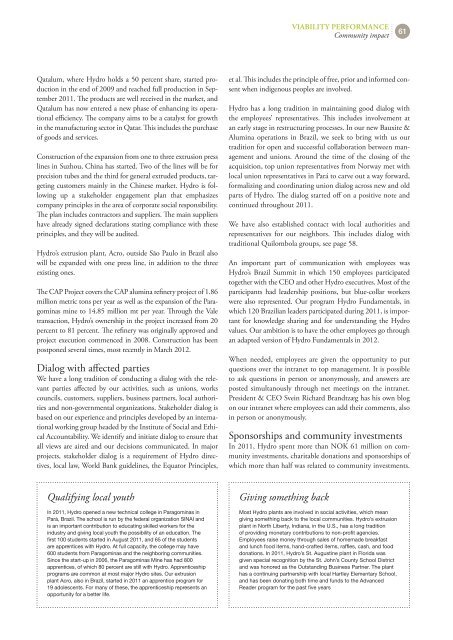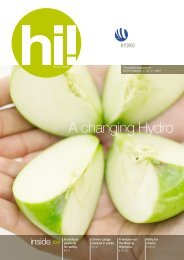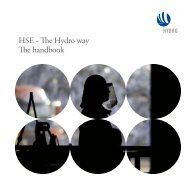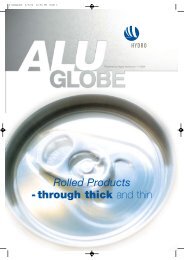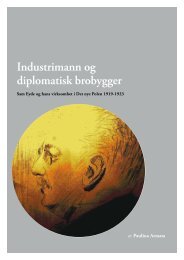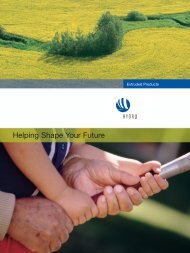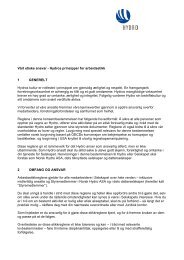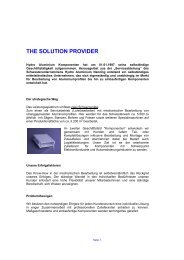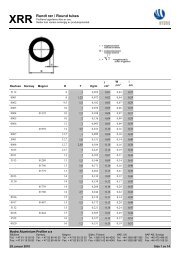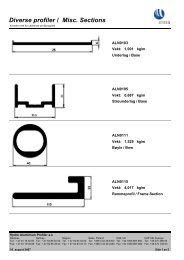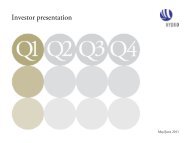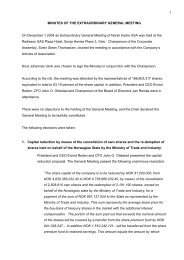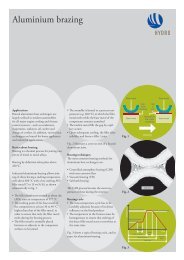Hydro Annual Report 2011b
Hydro Annual Report 2011b
Hydro Annual Report 2011b
You also want an ePaper? Increase the reach of your titles
YUMPU automatically turns print PDFs into web optimized ePapers that Google loves.
Qatalum, where <strong>Hydro</strong> holds a 50 percent share, started production<br />
in the end of 2009 and reached full production in September<br />
2011. The products are well received in the market, and<br />
Qatalum has now entered a new phase of enhancing its operational<br />
efficiency. The company aims to be a catalyst for growth<br />
in the manufacturing sector in Qatar. This includes the purchase<br />
of goods and services.<br />
Construction of the expansion from one to three extrusion press<br />
lines in Suzhou, China has started. Two of the lines will be for<br />
precision tubes and the third for general extruded products, targeting<br />
customers mainly in the Chinese market. <strong>Hydro</strong> is following<br />
up a stakeholder engagement plan that emphasizes<br />
company principles in the area of corporate social responsibility.<br />
The plan includes contractors and suppliers. The main suppliers<br />
have already signed declarations stating compliance with these<br />
principles, and they will be audited.<br />
<strong>Hydro</strong>’s extrusion plant, Acro, outside São Paulo in Brazil also<br />
will be expanded with one press line, in addition to the three<br />
existing ones.<br />
The CAP Project covers the CAP alumina refinery project of 1.86<br />
million metric tons per year as well as the expansion of the Paragominas<br />
mine to 14.85 million mt per year. Through the vale<br />
transaction, <strong>Hydro</strong>’s ownership in the project increased from 20<br />
percent to 81 percent. The refinery was originally approved and<br />
project execution commenced in 2008. Construction has been<br />
postponed several times, most recently in March 2012.<br />
Dialog with affected parties<br />
We have a long tradition of conducting a dialog with the relevant<br />
parties affected by our activities, such as unions, works<br />
councils, customers, suppliers, business partners, local authorities<br />
and non-governmental organizations. Stakeholder dialog is<br />
based on our experience and principles developed by an international<br />
working group headed by the Institute of Social and Ethical<br />
Accountability. We identify and initiate dialog to ensure that<br />
all views are aired and our decisions communicated. In major<br />
projects, stakeholder dialog is a requirement of <strong>Hydro</strong> directives,<br />
local law, World Bank guidelines, the Equator Principles,<br />
Qualifying local youth<br />
In 2011, <strong>Hydro</strong> opened a new technical college in Paragominas in<br />
Pará, Brazil. The school is run by the federal organization SINAI and<br />
is an important contribution to educating skilled workers for the<br />
industry and giving local youth the possibility of an education. The<br />
first 100 students started in August 2011, and 65 of the students<br />
are apprentices with <strong>Hydro</strong>. At full capacity, the college may have<br />
600 students from Paragominas and the neighboring communities.<br />
Since the start-up in 2006, the Paragominas Mine has had 800<br />
apprentices, of which 80 percent are still with <strong>Hydro</strong>. Apprenticeship<br />
programs are common at most major <strong>Hydro</strong> sites. Our extrusion<br />
plant Acro, also in Brazil, started in 2011 an apprentice program for<br />
19 adolescents. For many of these, the apprenticeship represents an<br />
opportunity for a better life.<br />
vIABIlItY perForMAnCe<br />
Community impact<br />
61<br />
et al. This includes the principle of free, prior and informed consent<br />
when indigenous peoples are involved.<br />
<strong>Hydro</strong> has a long tradition in maintaining good dialog with<br />
the employees’ representatives. This includes involvement at<br />
an early stage in restructuring processes. In our new Bauxite &<br />
Alumina operations in Brazil, we seek to bring with us our<br />
tradition for open and successful collaboration between management<br />
and unions. Around the time of the closing of the<br />
acquisition, top union representatives from Norway met with<br />
local union representatives in Pará to carve out a way forward,<br />
formalizing and coordinating union dialog across new and old<br />
parts of <strong>Hydro</strong>. The dialog started off on a positive note and<br />
continued throughout 2011.<br />
We have also established contact with local authorities and<br />
representatives for our neighbors. This includes dialog with<br />
traditional Quilombola groups, see page 58.<br />
An important part of communication with employees was<br />
<strong>Hydro</strong>’s Brazil Summit in which 150 employees participated<br />
together with the CEO and other <strong>Hydro</strong> executives. Most of the<br />
participants had leadership positions, but blue-collar workers<br />
were also represented. Our program <strong>Hydro</strong> fundamentals, in<br />
which 120 Brazilian leaders participated during 2011, is important<br />
for knowledge sharing and for understanding the <strong>Hydro</strong><br />
values. Our ambition is to have the other employees go through<br />
an adapted version of <strong>Hydro</strong> fundamentals in 2012.<br />
When needed, employees are given the opportunity to put<br />
questions over the intranet to top management. It is possible<br />
to ask questions in person or anonymously, and answers are<br />
posted simultanously through net meetings on the intranet.<br />
President & CEO Svein Richard Brandtzæg has his own blog<br />
on our intranet where employees can add their comments, also<br />
in person or anonymously.<br />
Sponsorships and community investments<br />
In 2011, <strong>Hydro</strong> spent more than NOK 61 million on community<br />
investments, charitable donations and sponsorships of<br />
which more than half was related to community investments.<br />
Giving something back<br />
Most <strong>Hydro</strong> plants are involved in social activities, which mean<br />
giving something back to the local communities. <strong>Hydro</strong>’s extrusion<br />
plant in North Liberty, Indiana, in the U.S., has a long tradition<br />
of providing monetary contributions to non-profit agencies.<br />
Employees raise money through sales of homemade breakfast<br />
and lunch food items, hand-crafted items, raffles, cash, and food<br />
donations. In 2011, <strong>Hydro</strong>’s St. Augustine plant in Florida was<br />
given special recognition by the St. John’s County School District<br />
and was honored as the Outstanding Business Partner. The plant<br />
has a continuing partnership with local Hartley Elementary School,<br />
and has been donating both time and funds to the Advanced<br />
Reader program for the past five years


